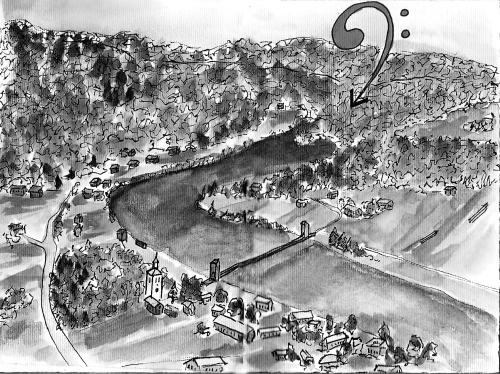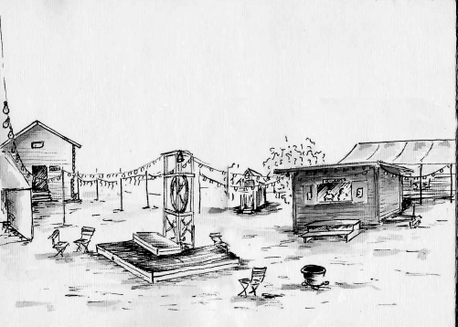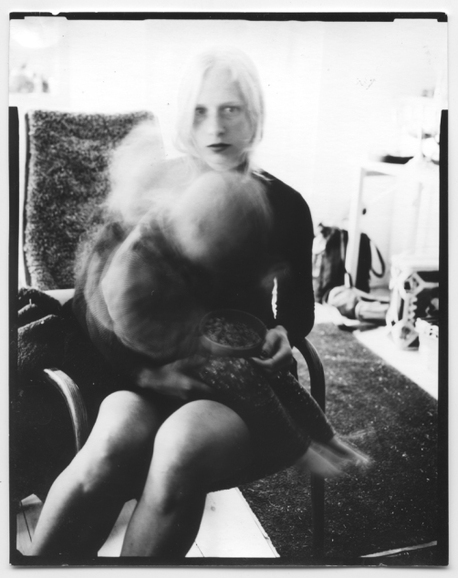They picked me up at the Dala-Floda station and now I am here in the northern South of Sweden, two days before the festival is going to start with the revealing of the secret of the first band. Im am sitting alone at a table, listening to the French boys and girls talking English – about movies. Everything seems a little smaller than last time. I must have grown. Ah, food is ready.
After lunch : During lunch I got to know some of the volunteers. Many of them did not come for the music in the first place, they rather came for the community-experience and/or because they are friends of the regular Hagenfesten volunteers. From Great Britain, from France, some Germans, Swiss and even Swedish. In this very moment they are lying in the sun, scattered on the lawn.
‘The shift work-shop starts in half an hour,’ Jens Linell said, who is taking care of the volunteers, to make them acquainted with the tasks they will have to fulfil during the festival. The French boys and girls are now speaking in French – about cinéma. During lunch I was also talking about myself – I said that I was going to write about the festival and that I am an editor of books – and about Nickelsdorf. When I related bits of the
Konfrontationen festival, I realized that I said, that in our festival the focus lies on improvisation – meanwhile it got the subtitle ‘An Improvised Festival’ – and that the focus on improvisation is analogous to the focus on the unexpected, it’s just a gradual difference. Because improvisation is a method that wants to provoke the unexpected as well as a method à faire la musique politiquement (to make music politically). Here we’re back to cinéma, because this last thought has got to do with Jean-Luc Godard. Karin, my theoral-accomplice, gave me a booklet which I brought with me. It is called Que faire and contains thoughts and ideas about the making of movies, that Jean-Luc Godard united in a manifesto that contains 40 declarations. More on that subject later.
Everything is still here at the Hagen : the river (when I arrived I thought, ‘Ah, down there the music is flowing‘), the clouds, the house, the winter garden kitchen, the floating sauna, the barns, the pavillion-tents (again), the wind, the serenity, as well as al the small wooden stools, the chairs, all the different benches and sofas, the Hollywood garden swing, the fauteuils, the candlesticks, the cups and little cups, ornamented with flowers and little flowers and hearts, wine glasses in all beautiful forms (respecting the cosmic harmonies of all the shapes and sizes), the tablecloths, the ashtrays, the bowls, the lamps and small lamps (lamparitos), stars and lampions, the garlands, the flower pots, the ribbons, curtains, blankets – probably all from the Loppis (second/third-hand dealer in Dala-Floda). The lawn was mowed very recently and where the high grass with its flowers doesn’t disturb, they let it be. The slope down to the river, the pontoon from where you jump into the water, the wooden buoy to hold on to, the Nils Holgersson geese, the bell, Lena and Jon, mother and father of
Joel Grip who had invited me, the field nearby, the raspberries, the campsite and again the serenity. Particularly when looking into the water, one can get the impression to be on an island. But the atmosphere and the mood that is spreading all over Europe, is inside us and we brought it to this island. We take our thoughts with us everywhere we go. We try to soothe our worries with the music, try to soothe my worries with the music.
Two weeks ago our festival took place,
Konfrontationen in Nickelsdorf. Andrew the square-jammer Choate and I, without having to discuss it, agreed that in this year’s edition we felt a kind of uncertainty, a political uncertainty. Many concerts were good, some very good, one was OUTSTANDING – they played with stones and flowers, the wind and the heat (
Ninh Lê Quan, percussion;
Michel Doneda, reeds - you can read The Attic interview with them
HERE).
Other concerts were not interesting at all. A usual combination. The uncertainty – maybe it was only us who felt it – had its point of departure at the threshold of the Jazzgalerie, at the isthmus that divides the fest from the village Nickelsdorf. In May this year the Austrian presidential elections took place and two thirds of the inhabitants of the village voted for the extreme-right candidate. I have the feeling that the ignorance changes into active rejection of the festival. Around the year 2000, when the right-wing/conservative government took power in Austria, some young drunk youths from the village attacked festival-guests on the campsite. I hope, this does not happen again, but I feel the potential. This year, a part of the sound-art exhibition was evicted, because the owner of the house where it took place, didn’t want to have any refugees in his house, as he said. He didn’t know that it was just tents. About this particular part of the exhibition :
Christine Schörkhuber: “We arrived on the dark side of Europe – the tents of Idomeni”
in collaboration with
Amir Zada, Bachir Abdulahad, Mahdir Nadir Hussain.
After the closure of the “Balkan route” a few months ago, thousands of people stranded at the greek/macedonian border. To overcome their speechlessness, their only possibility was to write their demands on their tents, hoping this lines would be transported and read. And they have been carried on to Nickelsdorf. Transfered, displaced and out of context they reappear as a relict of european history on trembling tarpaulin.
The tents had to go again. So they were put up right in front of the
Jazzgalerie and that had a much stronger effect.
At the same time the military is patroulling, carrying their weapons through the village. A friend, who was staying just accross the former former border in Hegyeshalom, and who was cycling back and forth every day, told me that he had seen Austrian soldiers, guns in their hands and people kneeling in front of them in the gravel with their hands behind their head. Dror Feiler made photos and was threatened and chased away.
All this is alienating. You can feel the “new self-assurance” of the military and the police. They are still hoping that their candidate is going to win in the repetition of the presidential election. Also in Vienna, since some time I see much more police in the streets, they’re everywhere with their fresh haircuts and ugly cars.
After a nap in the sun I woke up again on the island. The preparations are progressing, the volunteers are diligently doing their thing, although I heard Tilly say, ‘I feel more like sleeping.’ The peaceful atmosphere that lies on the Hagen was just startled by a cover of a pot falling on the tiles of the kitchen floor. Niklas Barnö walks past (organizer). I am going to jump into the water.
Lisa Grip, Joel's sister, came over and asked me if she could take a picture of me. She and her partner Erik Viklund make portraits with an old camera (Wista 4×5) of those present at the Hagenfesten during daytime and develop the photos in the night. Over the next days they will create an exhibition up in the gallery above the Stallet.
Next to me a French boy and an American girl are talking about the police. ‘When you see the police in the street (in Baltimore) you don’t think that they gonna protect you,’ she said. ‘Yeah,’ said he, ‘in France it’s the same now. There was a law enforcement, so they can take you in the street and bring you to the police station and hold you for two days without any reason.’
Dinner time is approaching and French noises are coming out of the kitchen, Cumbia on the boombox. Heaven is thundering. I fancy 1 beer.


